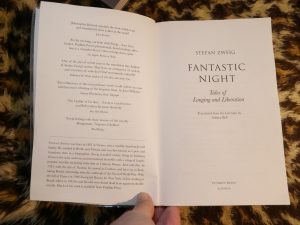
“Fantastic Night and Other Stories”
was written in 1922. Zweig was born in Vienna in 1881 to a wealthy Austrian Jewish family. He moved everywhere after he was a student in Berlin, he ended in London and New York and finally Brazil. He died in a double suicide with his wife in Brazil in 1942. These are “Tales of Longing and Liberation” says the inside of the front cover. These are loose terms and indeed I did not have any idea or want to have any idea what they meant. Zweig was an inspiration for Wes Anderson‘s Grand Budapest Hotel. You are probably thinking the same thing. Yep. Moustache.


The titular story
is the first and the longest (54 pages) of the collection. The main character, unnamed, tells his story through the narrator being given the text of the story that is to be told. This was quite a modern psychological concept of the time, which also means that it is dated and contextual. “Fantastic Night” (I love the title BTW, I really think the writer has totally captured our hearts and our imagination because you straightaway want to know what is it about the night that was fantastic?) is about man’s spiritual awakening. That night, became
the pivot on which my whole existence turns.
Turning is always a good theme for a story, that is the transformation for which the reader is looking. And before that night, the main character was a wealthy, seemingly worry-free, successful yet vacuous 36 year old man, someone who was trite and childish. Money does do that to people. Therefore the universal themes did apply then. How many successful vacuous people do you know?
I did not lack for success with women, and here too, with the secret collector’s urge which in a way indicates a lack of real involvement, I chalked up many memorable and precious hours of varied experience. In this field I gradually moved from being a mere sensualist to the status of a knowledgeable connoisseur. … But nothing stirred, I felt as if I were made of glass, with the world outside shining through me and never lingering within…
The scene at the races which was his so -called pivot, took a tad too long. I really wanted to know why Zweig could not get the story told quicker. Maybe it is that archaic suspenseful literary technique of storytelling which grates on me. The character experiences and toys with a minor indiscretion (well, basically, overt flirting with a married lady), leading to
the pull of criminality
Where the “criminality” referred to is how he managed to pull wool over the woman’s husband’s eyes, cheated the stupid bloke of his winnings, in order to impress the woman he was flirting with (who was BTW not pretty but fat and red-faced yet someone he found attractive because of her raucous, dirty laugh), and then to return the cheated money in an over-the-top overpayment secret gesture.
I felt myself, desiccated as I was, suddenly flowering again.
The word desiccated was very evocative of a decadent period, decaying morals, old money, despair, coconut. Although it was predictable but open conclusion, I think the darkness, moral nature and long-windedness of the story actually contributed to its power and I found it satisfyingly morbid.
Once a man has found himself, there is nothing in this world that he can lose.
I think that is really beautifully said. This is a metaphysical story that actually brings about ideas, a story that makes you think. You cannot read this without thinking: you won’t be able to enjoy its richness. This is where the universal themes come into play. A rich man must start from scratch in order to live. That is the moral of the story.
“The Governess”
was quite a brief old-fashioned story. Very simply it was about a nanny that got pregnant by Otto the lodger (a university student) of the household and she was so vehemently berated by her employer that she did something terrible to herself. The parents are supposedly on the moral high ground, they are cold, unfeeling and needless to say, wealthy (or wealthy enough to afford the nanny). The Frau of the house refers to the Fraulein’s condition:
“Excuses, excuses! Every promiscuous girl will offer that excuse! She’ll blame the first man who comes to mind and thinking nothing of it, hoping the good Lord will come to her aid. And a woman like that claims to be a governess and fit to educate girls. It’s outrageous. You sure don’t imagine that, in your condition, I shall keep you in my household any longer?”
This story was actually told in the third person, but from the children’s POV. I was very sad and frightened for the children she cared for, for truly they cared for her and thought she was very ill. They took the trouble to take their own money and buy white roses for her because they knew that she loved them. But it was too late. In this story, it was clear that the children were severely affected and upset because they were so attached to the nanny and the nanny to them.
“Letter from an Unknown Woman”
was the most powerful story in the colleciton, IMHO. I could not stop reading it. It was totally gripping and unsettling. The story spans a woman’s entire lifetime, from childhood to her early demise. The character that the story is about is not this woman, that is why this is such a clever story. That main character is a successful writer, who never speaks, to whom the entire story is addressed in second person, who receives a letter from a woman who is dying who turns out to have known and devoted herself to him all her life, from childhood onwards.
However, I did not guess that at the time age of thirteen, still a child, it was as it I had been immersed in fire. I though the tenderness was only for me, for me alone, and in that one second, the woman latent in my adolescent self awoke, and she in thrall to you for ever.
At first I thought this must be a stalker story. How foolish and modern I am. Turns out I am wrong.
The woman returns, becomes his lover, becomes mother to his child, becomes a prostitute and therefore making the writer her client in order to raise the child with middle-class luxuries, and all the time dedicated to him. She gave him so many chances to recognise her, as the little girl in the hallway of the apartment building they all lived in, who looked at him through the keyhole who grew up and left the apartment block and came back to become his lover. He never recognised her in more than twenty years despite having met her, fancied her, shagged her so many times. This story was about this character who was truly so solipsistic and narcissistic that he became blind and deaf to someone else, anyone else. They might as well not exist. And now they did not. It was too late, the letter said the son, their son, was ill and had died, and now she was dying too. Quite a depressing story and there is no light coming in from the window at any point. It was a dark, moving and disturbing story. Nuff said.
Conclusion
This is a fine glittering collection, will suit anybody who is a fan of that period of literature, the Viennese tradition, the Grand Budapest Hotel, the deepest, darkest moments of human emotions, loss, gripping passions, intense encounters. Very very excellent reading. It will transform your one evening into a “Fantastic Night”.

photo credit: LOBBY BOY / The Grand Budapest Hotel via photopin (license)
photo credit: via photopin (license)
